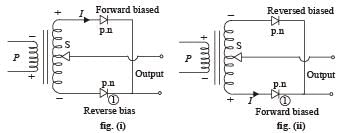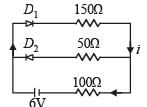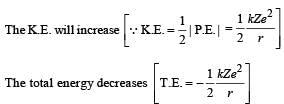JEE Advanced (Single Correct MCQs): Modern Physics - Airforce X Y / Indian Navy SSR MCQ
30 Questions MCQ Test Physics for Airmen Group X - JEE Advanced (Single Correct MCQs): Modern Physics
The plate resistance of a triode is 3 × 103 ohms and its mutual conductance is 1.5 × 10–3 amp/volt. The amplification factor of the triode is
The half life of radioactive Radon is 3.8 days. The time at the end of which 1/20 th of the radon sample will remainundecayed is (given log10 e = 0.4343)
| 1 Crore+ students have signed up on EduRev. Have you? Download the App |
An alpha particle of energy 5 MeV is scattered through 180° by a fixed uranium nucleus. The distance of closest approach is of the order of
Beta rays emitted by a radioactive material are
If elements with principal quantum number n > 4 were not allowed in nature, the number of possible elements would be
Consider the spectral line resulting from the transition n = 2 → n = 1 in the atoms and ions given below. The shortest wavelength is produced by
Fast neutrons can easily be slowed down by
Consider α particles, β particles and γ - rays, each having an energy of 0.5 MeV. In increasing order of penetrating powers, the radiations are:
An energy of 24.6 eV is required to remove one of the electrons from a neutral helium atom. The energy in (eV) required to remove both the electrons from a neutral helium atom is
A radioactive material decays by simultaneous emission of two particles with respective half-lives 1620 and 810 years.
The time, in years, after which one-fourth of the material remains is
The probability of electrons to be found in the conduction band of an intrinsic semiconductor at a finite temperature
A full-wave rectifier circuit along with the out-put is shown in Figure. The contribution (s) from the diode 1 is (are)
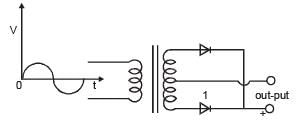

As per Bohr model, the minimum energy (in eV) required to remove an electron from the ground state of doubly ionized Li atom (Z = 3) is
The circuit shown in the figure contains two diodes each with a forward resistance of 50 ohms and with infinite backward resistance. If the battery voltage is 6V, the current through the 100 ohm resistance (in amperes) is
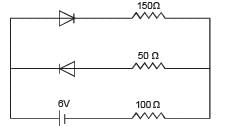
Which of the following statements is not true?
The maximum kinetic energy of photoelectrons emitted from a surface when photons of energy 6 eV fall on it is 4 eV. The stopping potential, in volt, is
In hydrogen spectrum the wavelength of Hα line is 656 nm, whereas in the spectrum of a distant galaxy, Hα line wavelength is 706 nm. Estimated speed of the galaxy with respect to earth is,
A particle of mass M at rest decays into two particles of masses m1 and m2, having non-zero velocities. The ratio of the de Broglie wavelengths of the particles, λ1/λ2, is
Which of the following is a correct statement?
Order of magnitude of density of uranium nucleus is, [mp = 1.67 × 10–27kg]
22Ne nucleus, after absorbing energy, decays into two aparticles and an unknown nucleus. The unknown nucleus is
Binding energy per nucleon vs mass number curve for nuclei is shown in the Figure. W, X, Y and Z are four nuclei indicated on the curve. The process that would release energy is
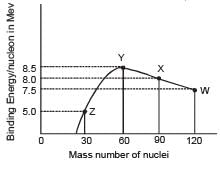
Imagine an atom made up of a proton and a hypothetical particle of double the mass of the electron but having the same charge as the electron. Apply the Bohr atom model and consider all possible transitions of this hypothetical particle to the first excited level. The longest wavelength photon that will be emitted has wavelength λ (given in terms of the Rydberg constant R for the hydrogen atom) equal to
The electron in a hydrogen atom makes a transition from an excited state to the ground state. Which of the following statements is true ?
Two radioactive materials X1 and X2 have decay constants 10λ and λ respectively. If initially they have the same number of nuclei, then the ratio of the number of nuclei of X1 to that of X2 will be 1/e after a time
Electrons with energy 80 keV are incident on the tungsten target of an X-ray tube. K-shell electrons of tungsten have 72.5 keV energy. X-rays emitted by the tube contain only
The electron emitted in beta radiation originates from
The transition from the state n = 4 to n = 3 in a hydrogen-like atom results in ultraviolet radiation. Infrared radiation will be obtained in the transition
The intensity of X-rays from a Coolidge tube is plotted against wavelength λ as shown in the figure. The minimum wavelength found is λC and the wavelength of the Kα line is λK. As the accelerating voltage is increased
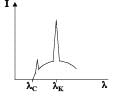
|
199 videos|422 docs|281 tests
|
|
199 videos|422 docs|281 tests
|




 uranium nucleus
uranium nucleus



 represents
represents




